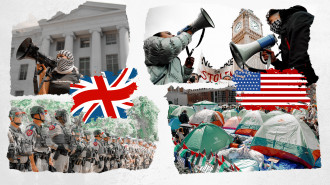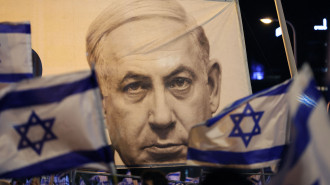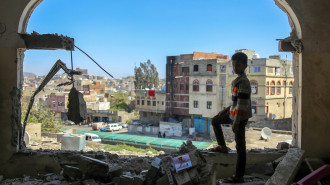
In crisis-hit Tunisia, IMF deal hangs in the balance

As preliminary, virtual talks with the International Monetary Fund (IMF) concluded last week, Tunisia is desperately eying the prospect for a potential multi-billion dollar rescue package to finance its budget and public debt repayments.
The global lender, known for its austerity policies, is likely to demand the reduction of the public sector wage bill, the revision of the policy of subsidising basic necessities along with support for some state-owned companies, and the granting of some funds to the poorest.
The Tunisian government’s official programme to the IMF, leaked in early January, details a fiscal proposal which includes cutting energy subsidies. The government document also specifies freezing salaries and recruitment in the public sector for 2022.
Around half of the Tunisian state spending goes to paying the salaries of around 650,000 public servants, which has tripled the wage bill of the public sector in the last 10 years, and is now one of the highest rates in the world constituting 16 percent of GDP. Additionally, state companies employ at least 150,000 people at the taxpayers' expense.
"The small North African nation requires an international rescue deal to unlock bilateral or multilateral credit, most crucially to avoid what could be an impending collapse in its public finances. Today, it has an extremely limited margin of manoeuvre"
Tunisians have endured a decade of economic stagnation since the 2011 revolution. In 11 years, the pro-capita GDP has dropped by 20 percent and purchasing power by 35 percent resulting from a 40 percent devaluation of the Tunisian dinar. As a result, there has been an unprecedented increase in public debt, which has risen to over 90 percent of GDP.
The Covid-19 pandemic further hit the national economy, which shrank by more than 9 percent in 2020. Unemployment has surged from 15.1 to 18.4 percent, and inflation has surpassed 6 percent on an annual basis.
Rising prices and job losses have pushed many in Tunisia’s middle class into poverty. “Tunisia’s economic and financial situation is extremely worrying, both on the macroeconomic level and from the perspective of Tunisians trying to get by”, said Max Gallien, a political scientist specialising in the political economy of the Middle East and North Africa, speaking to The New Arab.
“There’s a real problem of financial resources at a budget state level. The country needs external credits that amount to 12.6 billion dinars (3.9 billion euros),” Tunisian economist Ridha Chkoundali said to The New Arab, emphasising that new negotiations with the IMF have still not been launched.
“[Tunisia] has to finalise a new programme with the IMF, there’s no other solution,” he added.
Chkoundali also indicated that the war between Russia and Ukraine will have major repercussions on grain and oil prices, which could exacerbate the inflationary pressures eroding the Tunisian consumer spending power.
Two previous IMF loans -one worth 1.7 billion dollars in 2013 and another 2.8 billion in 2016- did little to redress the country's public finances. The fund called on the Tunisian authorities to implement structural economic reforms, stressing the need to reduce subsidies on essential goods such as fuel and staple foodstuffs and to invest state money in education, health and infrastructure.
“It’s an economy that needs very deep, structural reforms, especially to improve the business environment,” the IMF’s outgoing Tunisia envoy Jerome Vacher told AFP last month.
“An accord with the IMF is necessary to guarantee state budget balance”, Minister of Finance Sihem Bougdiri Namsia recently stated.
|
|
The small North African nation requires an international rescue deal to unlock bilateral or multilateral credit, most crucially to avoid what could be an impending collapse in its public finances. Today, it has an extremely limited margin of manoeuvre.
But many Tunisians who were already in financial trouble before the pandemic fear a deal that involves harsh reforms would result in more suffering for the most vulnerable.
Selling unpopular austerity measures to the general public will be very difficult at a time of deepening political turmoil since President Kais Saied seized wide-ranging powers last July, triggering a suspension in discussions with the IMF. His focus on the political agenda has cost valuable time to the detriment of the much-needed economic reforms. Saied has made few public statements about his economic policy.
According to Chkoundali, the reform approach should change in a way that is “less costly for the lower and middle classes,” and primarily targets those sectors of society that have benefitted from the old guard, particularly financial institutions. He believes the World Bank, which agreed this month to lend Tunisia $400 million to finance social policies, can play an important role in mitigating the social cost of economic reforms.
"A clear plan and a political settlement around reforms is missing, and competing economic interests and ideologies make widespread support for a reform programme 'extremely unlikely'"
The IMF asked for a national concertation between all stakeholders, meaning that President Saied is required to have the powerful UGTT labour union confederation and major political parties directly involved in order to generate the broad support needed to carry out any reforms.
Yet, the president has so far not signalled a change in his strategy to bypass representative bodies. The UGTT has also been sidelined, with Secretary-General Noureddine Taboubi and Kais Saied meeting last month for the first time since last summer’s power grab.
The trade union, for its part, has expressed opposition to subsidy reform for basic goods as well as freezing of hiring and wages in the public sector.
Chkoundali pointed out that widening the participation of the different stakeholders in the designing of the government's economic reform programme is key to concluding an agreement that, in his view, requires a change in the president’s discourse.
“Kais Saied should shift to a speech that unites Tunisians, includes all concerned players, and helps moving forward to the signing of a deal,” the economy expert maintained.
Gallien noted that a clear plan and a political settlement around reforms is missing, and competing economic interests and ideologies make widespread support for a reform programme “extremely unlikely”. He explained that while a deal is still possible, the question will be whether “a reform agenda that is coherent [and] meaningful” will be produced and help the country going forward.
“It seems likely that the discussion about Tunisia’s economic future will either be subject to another compromise of various powerful political veto players or trigger another political crisis,” he predicted, warning that neither outcome is in the interest of the Tunisian public.
Although discussions between the IMF and Tunisian authorities will continue in the coming weeks, an agreement may take time to materialise.
"In the event of a no-deal, the country could head towards default or demand a debt restructuring. Unless reforms are pushed through, it will continue to run out of its financial resources"
Donors say any accord is very unlikely before the summer, which may be too late to resolve top priority problems such as the import of staple subsidised goods -which are getting harder to find- as well as the payment of state salaries and the currency’s devaluation.
In the event of a no-deal, the country could head towards default or demand a debt restructuring. Unless reforms are pushed through, it will continue to run out of its financial resources.
“If the authorities do not reach an IMF agreement, they will not be able to mobilise the necessary loans and won’t be able to cover public spending except by the very worst solutions like printing money,” economist Ezzedine Saidane told Reuters.
Gallien spoke of “enormous pressure” on the public finances in the absence of any other bilateral agreement. “It would substantially increase Tunisia’s cost of borrowing and imply that it will quickly become unable to sustain its current spending, including public sector salaries and social programmes”, he anticipated.
Alessandra Bajec is a freelance journalist currently based in Tunis.
Follow her on Twitter: @AlessandraBajec
![Tunisians protest during the Covid-19 pandemic demanding financial aid from the government on March 30, 2020 as the pandemic and economic recession have taken a toll on the middle and lower classes. [Getty]](/sites/default/files/styles/large_16_9/public/1208724814.jpeg?h=5408d9e1&itok=bXuHGwhH)


